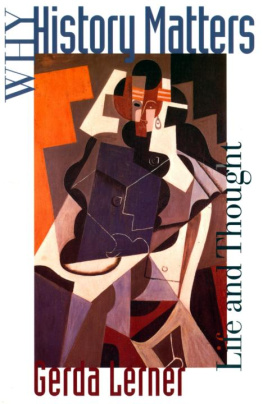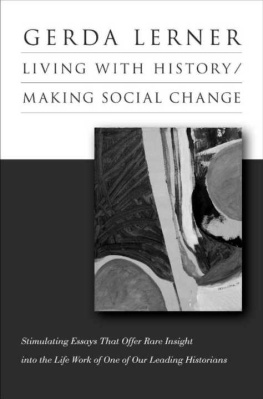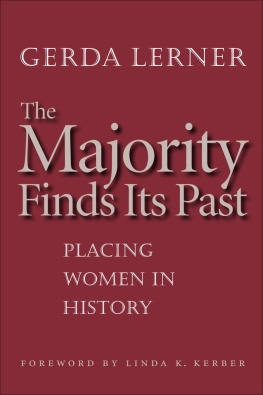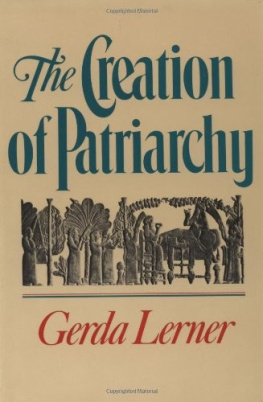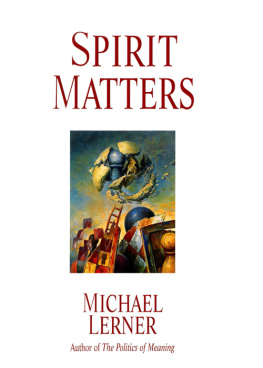Gerda Lerner - Why History Matters: Life and Thought
Here you can read online Gerda Lerner - Why History Matters: Life and Thought full text of the book (entire story) in english for free. Download pdf and epub, get meaning, cover and reviews about this ebook. year: 2010, genre: Home and family. Description of the work, (preface) as well as reviews are available. Best literature library LitArk.com created for fans of good reading and offers a wide selection of genres:
Romance novel
Science fiction
Adventure
Detective
Science
History
Home and family
Prose
Art
Politics
Computer
Non-fiction
Religion
Business
Children
Humor
Choose a favorite category and find really read worthwhile books. Enjoy immersion in the world of imagination, feel the emotions of the characters or learn something new for yourself, make an fascinating discovery.
- Book:Why History Matters: Life and Thought
- Author:
- Genre:
- Year:2010
- Rating:4 / 5
- Favourites:Add to favourites
- Your mark:
- 80
- 1
- 2
- 3
- 4
- 5
Why History Matters: Life and Thought: summary, description and annotation
We offer to read an annotation, description, summary or preface (depends on what the author of the book "Why History Matters: Life and Thought" wrote himself). If you haven't found the necessary information about the book — write in the comments, we will try to find it.
Why History Matters: Life and Thought — read online for free the complete book (whole text) full work
Below is the text of the book, divided by pages. System saving the place of the last page read, allows you to conveniently read the book "Why History Matters: Life and Thought" online for free, without having to search again every time where you left off. Put a bookmark, and you can go to the page where you finished reading at any time.
Font size:
Interval:
Bookmark:



GERDA LERNER
For Stephanie
her courage
her goodness
her wisdom
The period of the writing of these essays coincides with my work and tenure at the University of Wisconsin-Madison. The generous support for my scholarly work given by this institution in the form of research funds and research leaves has been immensely helpful to me and has been publicly acknowledged in my earlier books. This support has also enabled me to engage talented and knowledgeable research assistants who facilitated my work in innumerable ways. Of these, the most recent are Ann Spurgeon and Angela Nissing. I especially want here to thank them for their patient and reliable support of my work.
For several decades Sheldon Meyer has functioned as my editor, critic, and literary mentor. His broad knowledge of history, his fine critical skills and his patient support have strengthened me and allowed me to do my work under the best conditions. His involvement in the books has continued even after their publication, which, in today's climate in the publishing business, is a rare and remarkable occurrence and one I greatly appreciate. I am deeply grateful for his unwavering confidence in me and for his steady support of my work.
It has been my privilege and good fortune to have a working relationship with Leona Capeless which has extended over nearly twenty years. This is the fourth book of mine she has copyedited. Her superb knowledge of the rules and usage of English, combined with her flexibility in occasionally breaking the rules, her vast store of general information, and her respect for the style of the author and the meaning of the work have transformed a technical process into artistic cooperation. She has challenged me and I have learned a great deal from her. The work undoubtedly is the better for it, for which I thank her and with gratitude acknowledge her contribution.
A NOTE ON USAGE
The terms of reference by which African-Americans have referred to themselves have changed in the course of history. At any given time there has usually been a range of differences among them in how they prefer to be designated. I have followed the practice of using the designation chosen by the author or by the group in question during a particular historical period. (Thus: "Negro Women's club movement," but "Black Liberation.") African-Americans have struggled for over a hundred years to have the term used to designate them be capitalized, as are the designations for other ethnic or racial groups ("Italian, Spanish, Negro"). Thus, whenever the noun "Black" is used as a substitute for "African-American" or "Negro" it should be spelled with a capital B. There is a great deal of variation about the spelling of the adjective "black." One can reason both ways-"Black women and Italian women," both designating group adherence, or "black and white women," both designating skin color, hence lower-case. I usually capitalize the noun and lower-case the adjective, but I recognize that this usage is in transition.
A major point of my essay "Rethinking the Paradigm: I. Class, II. Race" is that the term "race" is itself a racist construct. (See Chapter 11, pp. 184-97, for the full argument and rationale behind this position.) I will therefore in the future join others in putting the word in quotes, in order to alert the reader to its essential inappropriateness. In this collection of essays, however, there are a number of essays written earlier in which the term is used without qualifications. As a historian, I cannot bring myself to alter earlier documents in order to conform to later insights. Since it might be confusing to the reader to see the term used with and without quotes in the same book, I have reluctantly decided to stay with the earlier usage of the word in this volume.
The reader should be mindful of the fact that "race" and "racial" are scientifically questionable and thoroughly inadequate terms for a number of concepts, for which the terms racial formation, experience of racism, experience of discrimination, and others might better be used.
G. L.
xi
PART I HISTORY AS MEMORY
PART II HISTORY: THEORY AND PRACTICE
PART III RE-VISIONING HISTORY
In my first volume of essays, The Majority Finds Its Past: Placing Women in History, I traced my development as a feminist thinker and a historian from 1960 to 1979.' The present volume continues this endeavor, including work done from 1980 to the present.
In these sixteen years the field of Women's History has grown spectacularly, both in institutional and in intellectual terms. Tens of thousands of Women's History courses have become a regular part of university and college curricula. Women's Studies, an interdisciplinary specialization, also grew by leaps and bounds. The broad appeal of Women's History can be gauged by the number of college and university positions held by specialists in this field. In 1972, when I founded and, with Joan Kelly, directed the first Women's History Master's degree program in the country, we were lonely pioneers. By 1988, some 202 institutions of higher education offering doctoral training reported having at least one faculty member specializing in the history of American women. In the past decade the field has continued to grow, with a number of institutions now offering training in European, Asian and Latin-American Women's History in addition to the American specialization. My own career reflects this development: in 1980 I accepted a position at the University of Wisconsin-Madison with the express mandate to create a Ph.D. program in Women's History.
Women's History has become one of the "frontiers" of historical scholarship. In the process of documenting and interpreting the female past, valuable monographic work began to fill in the blank spaces. A virtual avalanche of biographies of "forgotten and neglected women" of the past appeared on the list of scholarly publishers and stocked the shelves of bookstores to meet an ever increasing demand for such work. Almanacs, encyclopedias, reference works about women, flooded the market.
Interest in the history of women has spread to the K-12 system, to communities and libraries. The National Women's History Project, an organization in existence since 1977, distributes teaching materials, posters, books and videos in Women's History to its 20,000 subscribers. It initiates and supplies materials for the celebration of Women's History Month (March) in tens of thousands of communities across the country.
Font size:
Interval:
Bookmark:
Similar books «Why History Matters: Life and Thought»
Look at similar books to Why History Matters: Life and Thought. We have selected literature similar in name and meaning in the hope of providing readers with more options to find new, interesting, not yet read works.
Discussion, reviews of the book Why History Matters: Life and Thought and just readers' own opinions. Leave your comments, write what you think about the work, its meaning or the main characters. Specify what exactly you liked and what you didn't like, and why you think so.

